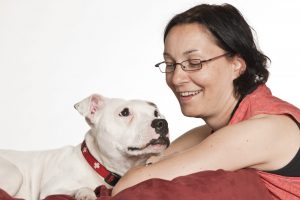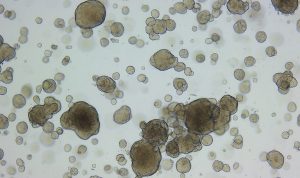Did you ever think that lab-grown dog organs could be used for medical research? Dr. Karin Allenspach and her company 3D Health Solutions are doing just that. A two-time Iowa State University I-Corps participant, Dr. Allenspach learned the skills to commercialize her research and bring it out of the lab so it can have an impact on the world.

Originally from Switzerland, Dr. Allenspach went to veterinary school and discovered her passion for veterinary research. This passion for research eventually led her to Iowa State University where she researches a variety of topics, primarily centered around translational health and medicine.
Her research led her to develop a technology utilizing Dog-Organoids. These organoids are small, lab-grown cells that can be used for both dog and human drug development. Organoids have previously been devolved from mice, but Allenspach’s team is the first to use dogs. Dog organoids can potentially reduce drug devolvement costs because they enable researchers to test drugs on tissue similar to humans without harming any animals.
“Instead of testing drugs meant to be going on to the human market on healthy dogs, you could do that in vitro with your mini organs. So, you would reduce the cost. And you would also be able to tell relatively quickly in the development process of the drug whether it’s going to work or not, which is really important. It takes 15 years and about 2 billion dollars per drug (development costs) that are successfully launched on the market. If you could cut down these costs early on and say, ‘this one’s never going to go anywhere’, that would be a huge cost saver.”

A Dog Organoid made of bladder cells. Utilizing Organoids could help reduce drug costs.
Allenspach participated in the Iowa State I-Corps program to learn more about commercializing her research. Although I-Corps didn’t solve the technical hurdles the team faced, it did help them learn more about the business environment.
“I think for me personally, the most helpful (part of I-Corps) was being introduced to people that were influential in getting stuff done. For example, an IP (intellectual property) lawyer here in Ames. Sitting down with them and figuring out a strategy with regards to the protection of IP was very beneficial. “
Participating in I-Corps also help the team raise money: in 2019 they were awarded a $225,000 SBIR grant from NSF (National Science Foundation). The company has had continued success, improving the technology and raising more capital.
“I’ve been in academia for more than 15 years, and I don’t think without coming here and being involved with this (I-Corps), I would have ever even thought about starting a company…
It’s nice if you’re at an institution where they think ultimately what we want you to do is not just research but actually get technology transferred into something useful… And to me that’s just really cool, right? I think that’s cool because usually all the stuff that we research is interesting, but it’s not going to go anywhere. So, I think it’s all really exciting.”
Interested in Dr. Allenspach and her team’s work? Check out their company, 3D Health Solutions.
Are you interested in a professional development opportunity that can take your research to the next level? Check out the Great Lakes I-Corps Hub. We have courses designed specifically for MedTech companies.
Learn more:
https://www.greatlakesicorps.org/events1/list/?tribe_eventcategory%5B0%5D=68
Photos from Iowa State University
Written by Chris Eakin
NSF I-Corps Hub Great Lakes Region, 2022
